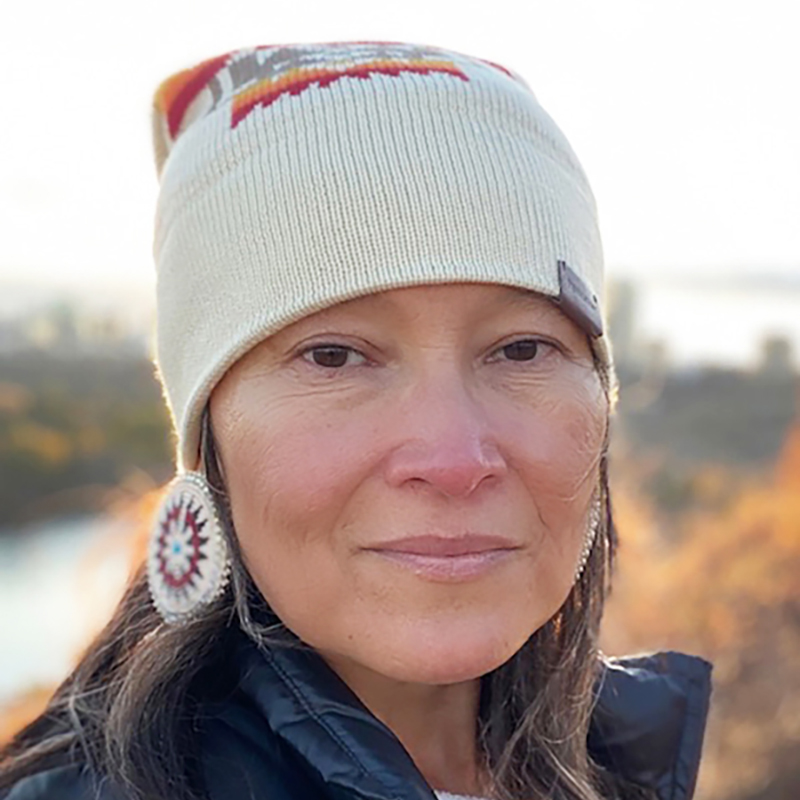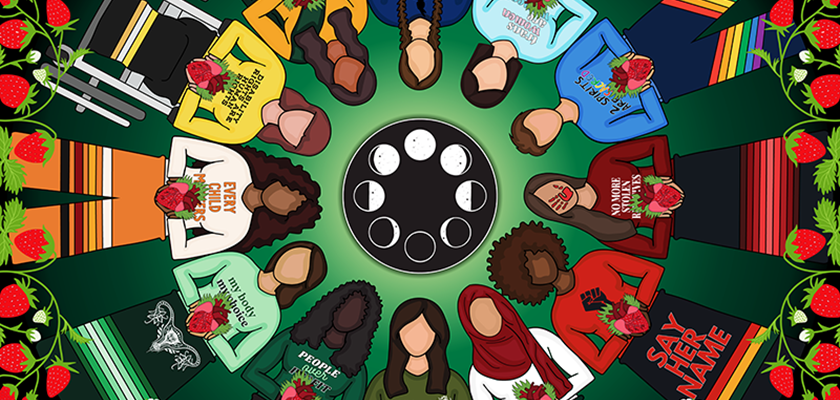An oath of antiracist conviction
A teacher’s commitment to addressing anti-Indigenous racism (includes and is not limited to):
- I have the will and commitment to learn from and stay with my personal discomfort. I understand that feeling guilty serves neither me nor Indigenous Peoples.
- I actively recognize the wrongdoing associated with the Indian Residential School System, Sixties Scoop, and other aspects of the oppressive history of Canada’s treatment of Indigenous Peoples.
- I am responsible for what I do today and choose to interrupt oppressive colonial history through my commitment to teach the truth about it.
- I care about others without co-opting or prying into their cultural ways or practices. I recognize that Indigenous culture has been continuously objectified, stolen and outlawed; therefore, it is inappropriate to feel entitled to seek sensitive cultural information directly from individuals. I instead practice self-inquiry into my motives while focusing on my commitment to learning from Indigenous scholarship in the fields of Indigenous Education and Indigenous Studies.
- I respect the space of Indigenous ceremony, including smudge, without attempting to recreate it.
- I believe that all parents do their best and know that the way they show up for their child is not necessarily a reflection of their love for their child. I reject the assumption that, if a family or parent is less involved than others, it indicates lack of love and care for their child; all parents do the best they can.
- I understand that a child’s brain is not fully developed and reject assumptions that forgetful or tardy children are less competent than those who are focused and on time. I reject assumptions that any child who forgets their lunch or arrives late is inferior in any way.
- I foster the highest and most reasonable expectations of all students’ academic capacities regardless of race, class, gender, sexuality or ethnicity.
- I engage with pedagogical humility by graciously learning from personal misunderstandings and mistakes rather than assuming a defensive, expert position.
- I courageously take opportunities to learn, question, and develop professionally in Indigenous Education and Indigenous Studies and to respect what is being called for by Indigenous leaders and educators in this area.
- I critically rethink the world around me, including the taken-for-granted of how things are done.
- I release Indigenous students from expectations that they be experts or knowledgeable about anything Indigenous.
- I reject stereotypes that quiet Indigenous students have lower learning capacities, and I recognize Indigenous students as greater than the intergenerational trauma they are likely surviving.
- I expect no praise for teaching truth and take it as a responsibility and part of a legacy of my own contribution to a more just future.
- I rejoice in difference and finding ways to nourish and be nourished by the richness of diverse ways of thinking and being.
These oath statements of antiracist conviction reflect the habits of some of the most effective and trusted settler individuals I have learned from over my 25 years as a practitioner in Indigenous education. These pledges offer what many of us as Aboriginal educators hoped for with the development of competency 5 of the 2019 Teaching Quality Standard (TQS): Applying Foundational Knowledge about First Nations, Métis, and Inuit.
I offer antiracist conviction as a way to engage with competency 5, create opportunities for necessary self-reflection, and catalyze social and political change. Antiracist conviction calls for settlers and institutions to be actively aware of their own history and identify the benefits inherited from colonialism. Settlers, both white and racialized, can be effective at impacting social and political change if their antiracist conviction is backed up by an understanding of how they benefit from colonial structures of oppression. They are grounded in conviction, and where I come from, that is “walking your talk.” In this case, the making of competency 5 is the metaphoric talk, and now it is time to walk the language of competency 5 pedagogically. These oath statements rely on Alberta’s teachers and school leaders to assert the political will required to fulfill Teaching Quality competency 5.
I introduced the term antiracist conviction (Sockbeson 2019) as an opportunity for educators and institutions to actively apply antiracist theory and practice and address in concrete and material ways how multifaceted layers of racism continue to increase and reinforce the achievement gap between Aboriginal and non-Aboriginal students. It has long been clear that continuing to engage with deficit approaches in education, where Aboriginal students and their perceived deficiencies are blamed for achievement gaps, is a self-defeating approach uncritically resting on existing structures of division and disenfranchisement. We can no longer simply talk about building the resilience of Aboriginal students while silently perpetuating the very systems that cause the harm Aboriginal students need to brace themselves against. As Chagdud Tulku (Drolma 2003) observed, “trying to change the world without changing our minds is like trying to clean the dirty face in the mirror by scrubbing the glass.”
Antiracist conviction calls for settlers and schools to hold up mirrors to their own history in Canada and identify how they still benefit today from colonial subjugation and past genocidal policies. Recognizing the many continuing benefits of this past means accepting being implicated by them. A recognition of being implicated in neocolonial forms of oppression is not about blame but, rather, responsibility. This means continual reflection on how educational practices might reinforce the very practices they claim to want to dismantle, and then acting to name and correct them.
“White people tend to think we are like a convenience store, they like to come in and buy the candy, the M&Ms of our culture and spirituality, and leave behind all the cleaning products, like the oppression, colonialism and racism.”
—Rene Attean, Penobscot Elder, scholar and basket maker
In 2013, I was part of a small team of Aboriginal scholars who coauthored and led the delivery of the University of Alberta’s first compulsory course for teachers in Indigenous education. Since then, the course has reached well over 10,000 preservice teachers in Alberta, yet there exist over 50,000 practicing teachers in the province who, if they attended a preservice teacher education program in Alberta, were not required to take an Aboriginal education course. One of my core hopes was that the course would begin to critically address Aboriginal people’s racist experiences in schools and society at large. The leading reason Aboriginal students depart early from school is racism, and we must systematically address this in both our administrative and pedagogical approaches (Hampton & St. Denis 2002).
By adopting these oaths, settler educators can purposefully engage antiracist policy and practice when expanding knowledge systems in educational institutions. This space of engagement must prioritize “difficult” knowledge above “lovely knowledge” (our dances, food and stories) that late Elder Rene Attean identified as the “M&Ms” (Attean 1992; Pitt &
Britzman 2010).
References
Alberta Education. 2020. Teaching Quality Standard. Alberta Education website. https://open.alberta.ca/dataset/14d92858-fec0-449b-a9ad-52c05000b4de/resource/afc2aa25-ea83-4d23-a105-d1d45af9ffad/download/edc-teaching-quality-standard-english-2020.pdf (accessed Dec. 29, 2022).
Attean, R. 1992. “White People Tend to Think We are Like a Convenience Store.” Panel presentation at the University of Maine Native Awareness Month Event, Orono, Maine, April 8.
Drolma, S., ed. 2003. Change of Heart: The Bodhisattva Peace Training of Chagdud Tulku. Padma Publishing.
Hampton, E., and V. St. Denis. 2002. Literature Review on Racism and the Effects on Aboriginal Education. https://guides.library.ualberta.ca/ld.php?content_id=34520518 (accessed Dec. 29, 2022).
Pitt, A., and D. Britzman. 2010. “Speculations on Qualities of Difficult Knowledge in Teaching and Learning: An Experiment in Psychoanalytic Research.” International Journal of Qualitative Studies in Education 16(6), 755–776.
Sockbeson, R. 2009. Waponahki Intellectual Tradition of Weaving Educational Policy. Alberta Journal of Educational Research, 55(3), 351-364.
Sockbeson, R. 2019. “Maine Indigenous Education Left Behind: A Call for Anti-Racist Conviction as Political Will Toward Decolonization.” Journal of American Indian Education 58(3), 105–129.

Penobscot Indian Nation and Alexis Nakota Sioux Nation Professor of Indigenous Peoples Education, University of Alberta
Read more
View the entire digital issue of the ATA Magazine



